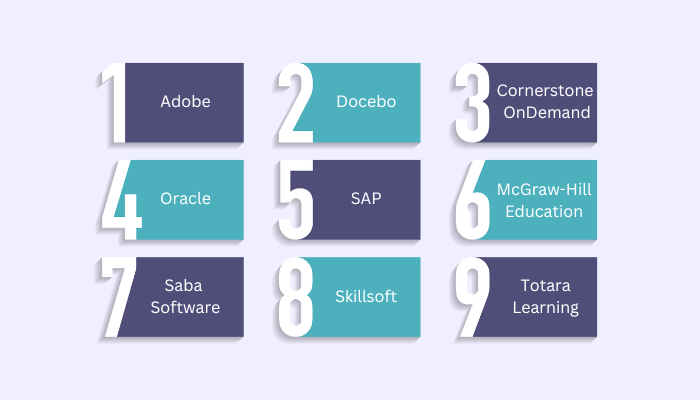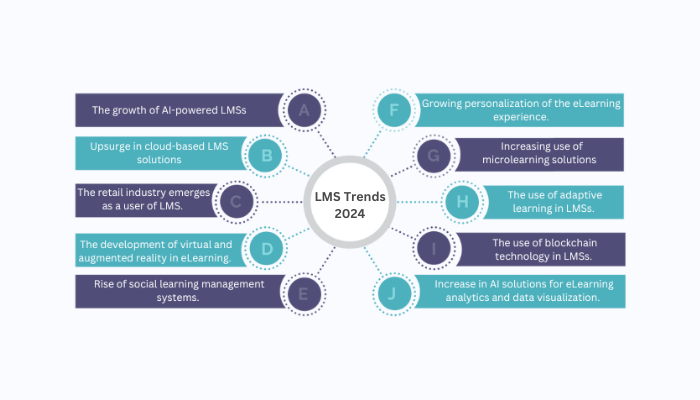LMS Trends.
This is the term that everyone is googling trying to learn what’s going on in the learning management industry.
Being one of the largest sectors of the Edtech industry, LMS systems are widely used and popular in the market. Well, there are many businesses as well as educational institutes that use LMS systems. All of them are looking keenly at LMS trends.
If you are one of these or just someone curious about learning management system industrial trends, this blog is for you.
Here, we shall be discussing all you need to know about these trends and more. So let’s get right into it:
Learning Management System Market

Before we dive into LMS trends, one must first understand the learning management system market as a whole. And that’s what we shall be doing in this industry.
Let’s start with this: the learning management system market is growing rapidly, as more and more organizations are adopting online learning solutions.
The global LMS market is projected to reach USD 40.95 billion by 2029, at a CAGR of 14.2%.
Moreover, the cloud segment is expected to be the fastest-growing segment during the forecast period, at a CAGR of 16.7%.
In addition to this, the enterprise segment is expected to be the largest market during the forecast period, with a market share of 52.8% in 2022.
Now, you must be wondering, what’s the reason behind such massive growth in the learning management system market, leading to LMS trends.
Well, there are a number of factors. Let’s see what these are:
There are a number of factors driving the growth of the LMS market. These include:
- The increasing popularity of online learning
- growing demand for e-learning in the corporate sector
- need for improved training and development programs
- rising adoption of mobile learning
- increasing focus on personalized learning
And with this out of the way, let’s take a step closer to LMS trends, but before that, we shall be going through the best corporate LMS systems in the section below:
Best Learning Management Systems

Being one of the most popular forms of elearning development, learning management systems are quite popular.
Many companies have created their own versions of LMS. And in this section of the blog, we shall be looking at some of the more popular ones.
These are, as mentioned below:
- Adobe
- Docebo
- Cornerstone OnDemand
- Oracle
- SAP
- McGraw-Hill Education
- Saba Software
- Skillsoft
- Totara Learning
With this out of the way, it’s time to discuss the LMS industry trends in the section below.

LMS Trends 2024

Learning management systems play a big role in the digital learning world. That’s why there are so many eyes on LMS trends.
Well, to my relief, we shall be discussing some of the best LMS trends for 2024. So with this being said, let’s get right into it:
1. AI-powered LMS
AI, AI, AI!
Artificial Intelligence or what we all preferably call AI is one of the most popular and groundbreaking technologies today.
In recent years, the use of AI has increased a lot and we have seen the result this remarkable tech is able to deliver. Leading to immense growth in people wanting to develop AI solutions.
Well, one of the best implementations of AI is in learning management systems.
Artificial intelligence (AI) is being increasingly used to personalize learning experiences, provide recommendations, and track learner progress.
AI-powered LMSs can also help to automate tasks such as grading and reporting.
2. Cloud-Based LMS Development
Well, Cloud technology is a technology that has been one of the leading LMS trends for a long time now. And it’s not showing any sign of slowing down.
Driven by SaaS development, Cloud-based LMSs are becoming increasingly popular due to their scalability, flexibility, and cost-effectiveness.
Moreover, Cloud-based LMSs can be accessed from anywhere with an internet connection, making them ideal for remote and mobile learners. This is what makes it one of the leading learning management system trends.
3. The retail industry emerges as a user of LMS
We all know that LMS solutions are being used in educational institutes and also corporate settings.
Did you know that the retail industry is one of the leading users of learning management systems? Well, the retail industry is increasingly using LMSs to train employees on new products, sales techniques, and customer service procedures.
LMS can help retailers improve employee engagement and retention, and to deliver training more efficiently.
This is surely one of the most unexpected LMS trends.
4. VR/AR in eLearning Systems
AR and VR are two technologies that are leading industry 4.0. So, it doesn’t come as a surprise that these two visual technologies are also one of the LMS trends.
Virtual reality (VR) and augmented reality (AR) are emerging technologies that have the potential to revolutionize eLearning.
VR can be used to create immersive learning experiences that transport learners to different environments.
AR can be used to overlay digital information in the real world, providing learners with interactive learning experiences.
5. Social Learning Management Systems, One of the Leading LMS Trends
This is a rather unique LMS trend.
We have all seen a range of variations in learning management systems. However, have you ever heard of social learning management systems?
Let us introduce you to this:
Social learning management systems (SLMSs) allow learners to connect with each other and share knowledge.
SLMSs can be used to create online communities where learners can ask questions, collaborate on projects, and share best practices.
This is one of the best and most creative examples of learning management systems. And this is something that a lot of people are going to enjoy.
6. Personalization of the eLearning experience
We are yet again faced with a megatrend, personalization in mobile app development.
And here’s how it became one of the LMS trends: Learners are increasingly demanding personalized learning experiences.
LMSs that can track learner progress and preferences can deliver personalized content and recommendations.
This can help learners to learn more effectively and efficiently.
7. Microlearning in corporate employee training programs
Microlearning is a type of learning that delivers small, bite-sized pieces of content.
This type of learning is ideal for corporate employee training programs because it can be easily consumed on the go.
An increase in gamification practices for online courses.
Gamification is the use of game-like elements in non-game contexts. Gamification can be used to make online courses more engaging and motivating.
So, if you are going for education app development, this is something that you should definitely consider.
8. Adaptive Learning: Leading LMS Trends
Adaptive learning is one of the best LMS trends.
But what is it?
Well, adaptive learning is a type of learning that adapts to the individual learner’s needs.
In addition to this, Adaptive learning systems can track learner progress and adjust the difficulty of content accordingly. This can help learners to learn more effectively and efficiently.
9. Blockchain technology in LMS
Blockchain in LMS?
Well, you heard it right, blockchain technology is one of the LMS trends and also one of the best ones.
For those who only incorporate blockchain with Cryptocurrency, Blockchain is a distributed ledger technology that can be used to track and verify transactions.
Therefore, blockchain can be used in LMSs to track learner progress, manage digital certificates, and protect user data.
Now, you can build an LMS blockchain app.
So, these are some of the best LMS trends of 2024. And with this out of the way, let’s discuss why you should incorporate LMS trends in your next project.
Why Incorporate LMS Trends in Your Learning Management System Development Project?
There are a lot of businesses and institutes that are considering learning management system development.
If you want to go for Custom LMS development from scratch, you should definitely consider including LMS trends.
Here are a few reasons to do so:
- Enhanced User Experience
- Personalization and Adaptive Learning:
- Gamification and Microlearning
- Social Learning and Collaboration
- Analytics and Reporting
With this out of the way, we conclude our blog.
Conclusion
It goes without saying that LMS systems are very important and popular in the market. With this, there are a lot who want to create their own custom LMS. Now, in this case, it is more than important to consider LMS trends. The trends can help you take user experience, personalization, and overall value of the system to the next level, as we discussed in this blog.
FAQ
Some trends in LMS include microlearning, mobile compatibility, AI-driven personalized learning paths, social learning features, and gamification for enhanced engagement.
Mobile compatibility allows learners to access LMS platforms anytime, anywhere, leading to increased engagement, flexibility, and personalized learning experiences.
Microlearning involves delivering content in short, focused bursts, making it easier for learners to consume and retain information. Its popularity stems from increased attention spans and the need for just-in-time learning.
AI-powered LMS platforms can analyze learner data to deliver personalized recommendations, adaptive learning paths, automated assessments, and intelligent content curation, enhancing the overall learning experience.
Social learning features in LMS platforms facilitate collaboration, peer-to-peer interaction, knowledge sharing, and community building among learners, fostering engagement and deeper understanding.
Gamification incorporates game-like elements, such as points, badges, leaderboards, and challenges, into the learning process, promoting motivation, healthy competition, and increased participation.
LMS trends improve employee training by providing personalized, on-demand, and engaging learning experiences, resulting in better knowledge retention, skill development, and overall performance.
Data analytics in LMS enables organizations to gather insights on learner behavior, progress, and performance, allowing them to make data-driven decisions to improve training programs and learning outcomes.
Yes, VR and AR technologies are increasingly integrated into LMS platforms to create immersive and interactive learning experiences, particularly in fields like healthcare, engineering, and skills training.
Microcredentialing, which involves offering digital badges or certifications for specific skills or accomplishments, aligns with LMS trends by providing learners with bite-sized, tangible credentials to showcase their expertise.
LMS trends in educational institutions foster student engagement, personalized learning experiences, and efficient administration of courses, ultimately leading to improved academic performance and student satisfaction.

Yashshree Purohit, an experienced Technical Content Writer at Nimble AppGenie boasts over 5 years of expertise crafting compelling content across multiple domains. Passionate about transforming complex ideas into clear and compelling narratives, she excels in creating content that resonates with the audience.
Table of Contents












No Comments
Comments are closed.